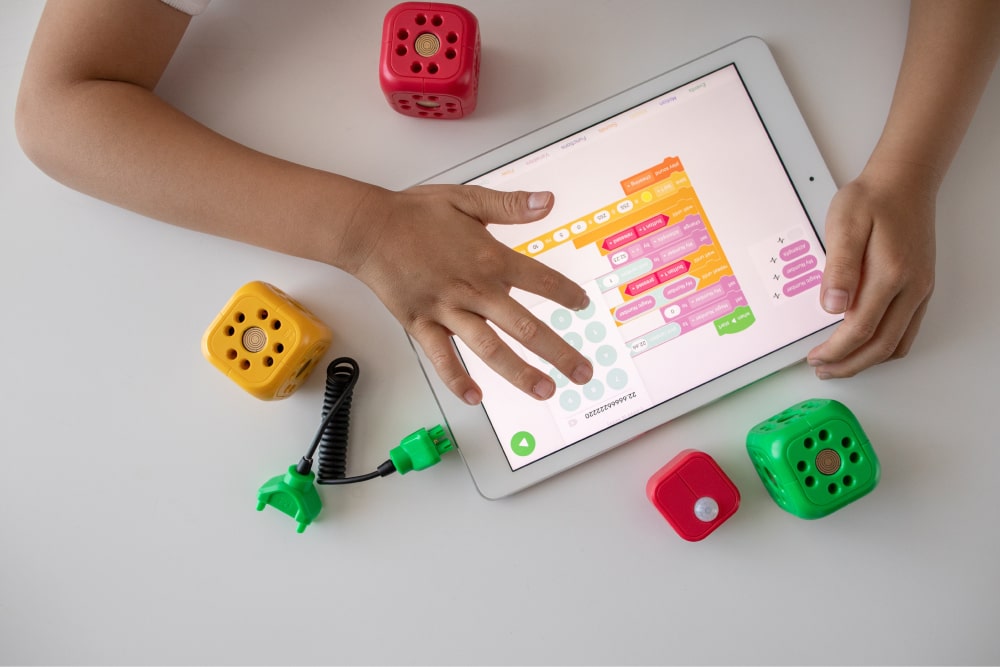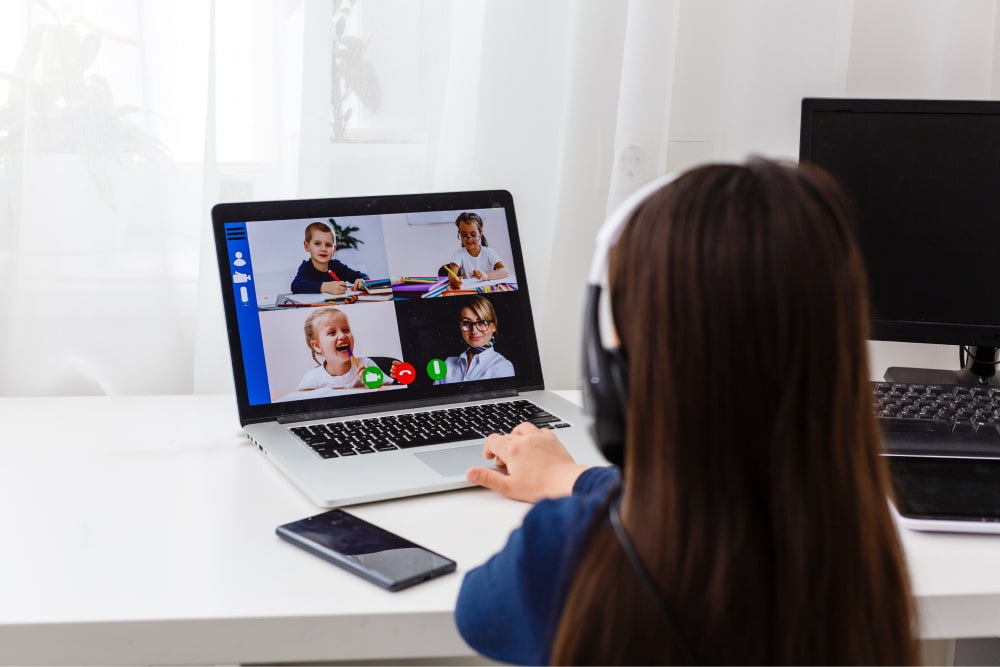User Testing at Ballyraine NS, Ireland
The pupils of Ballyraine National School enjoyed further learning about media under four topics (What is Media, Advertising Literacy, Fake News and Social Media). The ‘Minding Media Teacher Toolkit’ was taught to four different classes and there was lots of fun and excitement evident among the pupils. Pupils had the opportunity to work in groups to investigate advertisements on the school iPads, to check if images online were real or fake and to search for information, while being aware that some messages and information online could be misleading. This is a very important aspect of their everyday life because children are exposed to media nonstop and the Minding Media Teaching Toolkit gives them the key messages they need to make better choices.
Minecraft for Education
Minding Media is a project that combines media literacy and Minecraft Education Edition to teach students about responsible media consumption and creation. In the project students can visit Media Wood and meet some of its fun residents and at the same time learn about
Media, Advertisements, social media and fake news through four different storylines. Through this project, students learn about media ethics, bias and accuracy, as well as develop their technical skills. Through Minding Media students not only gain a deeper understanding of media literacy but also learn through game-based learning in a fun and engaging way. The project can be a useful tool for promoting media literacy among students and preparing them for a world where technology and media play a crucial role.
Media Literacy for Generation Alpha
Generation Alpha are commonly referred to those born after 2010. They have been born into a world of seamless technology and are sizeable consumers of digital communications tools. By gaming, watching content, and communicating online, these digital natives are confident users of the internet, and they enjoy engaging with the online world. While appearing expert in using digital communication technologies such as mobile phones, apps and gaming consoles, children’s capacity to recognise the persuasive tactics or selling intent of media messages is still developing. Children remain vulnerable to the harms of the internet, and as they mature into teenagers are still susceptible to the appeal of advertising and fake news. Advertising literacy, the ability to recognise persuasive intent and selling intent, provides a cognitive defence to persuasive marketing appeals and fake news.

A Common Sense Media study revealed that the average screen time for kids between eight and 12 years was five hours a day, and for teens it was well over seven hours in 2019. Unsurprisingly, according to this recent study, much younger kids got increasingly exposed to screens during the global lockdowns.
Concerned adults worry about children’s excessive screen time or that online risks outweigh the benefits. The temptation for these parents is therefore to focus more on restricting internet use than on enabling their children to participate online in a safe manner.
While the impact of screen time on children is still being debated, the UNICEF’s Growing up in a connected world report suggests that what children are doing online has more bearing on their wellbeing than how much time they spend online and that children who are more active online are also better at managing online risks.
So rather than hindering children’s internet use, adults should learn how to effectively facilitate the online experience. But faced with the complex and fast evolving technologies, many parents do not feel sufficiently confident to guide their often more tech-savvy children.
It is important to keep in mind that risk does not always lead to harm. Children exposed to online risks may not suffer harm if they have the knowledge and resilience to cope with the experience.
Online risks for children
The OECD Typology of Risks provides a practical examination of emerging risks that parents, educators, and children should be made aware of. Simplified, these are:
To investigate on how to keep children safe online, go to https://theprint.in/health/for-children-using-internet-content-matters-more-than-time-heres-how-to-keep-them-safe/858050/

While Generation Alpha (those born after 2010) are more familiar with digital marketing content, familiarity does not necessarily translate into understanding of persuasive intent. Evidence suggests children remain vulnerable to the harms of the internet, and as they mature into teenagers are still susceptible to the appeal of advertising and fake news. Although children’s persuasion knowledge inevitably increases, the nature and form of the commercial messages also becomes more sophisticated, stealthy, and covert, thus developing the requisite cognitive competences and defenses in children remains challenging. The COVID19 pandemic has resulted in increased usage of digital media for all age cohorts in society, further underlining the need for children to acquire multiple media literacies.
Therefore, Minding Media, has been carefully designed to meet the needs of primary school educators and their pupils, and is also aligned with partner needs, all of whom are educational providers. Our project responds to our common desire to increase the advertising literacy of children and wider society.
Media Literacy Education (MLE) is not taught as a mandatory school subject, reinforcing the fact that best MLE is fragmented and cross curricular. Thus, our project responds to the demand for participatory media literacy curricula and provides digitised resources dedicated to one element of media literacy responding to the need for a less fragmented approach to primary school MLE.
For children and young people, the project responds to their direct need for critical media skills in the face of a digitizing society. Between the ages of 8 and 12 is a key development stage in children’s understanding of the persuasive intent of commercial messages. Children are capable of critically appraising message content; however, enjoyment of advertisements depreciates the motivation to activate message resistance strategies. Minding Media understand that multiple media literacies, including advertising literacy, must be promoted, as they empower children to critically evaluate media messages and make informed choices.

The European E-learning Institute (EUEI) is committed to providing high-quality learning experiences and innovative educational programmes which engage learners from a range of sectors and socio-economic backgrounds. EUEI is committed to promoting social cohesion, inclusion, and sustainability across Europe, making them a perfect fit for the Minding Media Project.
Our experienced team of trainers, researchers and technical experts are uniquely placed to guide educators from VET, HEI, Adult and Youth sectors to harness the opportunities that innovative and collaborative e-learning and digital tools offer for learners.
We specialise in the delivering of high quality, responsive and innovative projects to educators and learners in the topics of pedagogic approaches, entrepreneurial competences, digital skills, inclusion, and sustainability.
Meet our Climate Champions at EUEI working on the SFEC project
Canice Hamill- Managing Director
Canice has worked in the field of lifelong education for over 20 years and is recognised as an expert in instructional design and the development of e-learning solutions for education and training. A former trainer and lecturer, Canice utilises a holistic approach to creating innovative, interactive learning environments and works closely with tutors, trainers, and development teams, emphasising the importance of empathy and user experience in every learning solution.
Our Logician -Innovative Inventors with an unquenchable thirst for knowledge
Catherine Neill- European Project Manager
An experienced EU project manager, Catherine is an integral member of our team. She is an effective communicator and has a strong background in areas of Inclusion. The oldest of 5 children Catherine quickly learned how to lead the pack, utilising organisational skills alongside her passion for helping others, she is committed to making the world a more accessible, sustainable, and friendly place.
Our Protagonist -Charismatic and inspiring leaders, able to mesmerise their listeners.
Aine Hamill- European Project Officer
Aine plays an important role in the learning design and subsequently in evaluating the effectiveness of our eLearning products on completion. Aine is always keen to engage with her creative side and implement the newest digital tools, pedagogies, and trends into our e-learning solutions. She is passionate about finding effective and relevant ways to engage learners from all walks of life.
Our Defender-dedicated and warm protectors, able to implement ideas and “create order from chaos”.
Including our key role in the initiation of the SFEC project we will also work tirelessly alongside our project partners to deliver the highest quality project results as possible. Within the project EUEI will develop the project website and be responsible for the technical realisation of the materials.